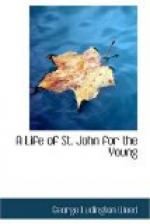The garden of Gethsemane was an enclosed piece of ground. We are not to think of it as a garden of flowers, or of vegetables, but as having a variety of flowering shrubs, and of fruit-trees, especially olive. It might properly be called an orchard. On the spot now claimed to be the garden, there are several very old gnarled olive-trees. Having stood beneath them, I would be glad to believe that they had sheltered my Lord. But I remember that when the prophecy concerning Jerusalem was fulfilled, the most sacred trees of our world were destroyed.
[Illustration: THE VALLEY OF JEHOSHAPHAT Old Engraving Page 164]
Who was the owner of that sacred garden? He must have known what happened there “ofttimes.” Perhaps, like the “goodman of the house” in Jerusalem, he was a disciple of Jesus, and provided this quiet retreat for the living Christ, in the same spirit with which Joseph of Arimathaea provided a garden for Him when He was dead. To these two gardens John is our only guide. From the one he fled with Peter in fear and sadness: to the other he hastened with Peter in anxiety followed by gladness.
When at the foot of Hermon, Jesus left nine of His disciples to await His return. Now one was no longer “numbered among” them, as Peter afterward said of him “who was guide to them that took Jesus.” At the entrance to the garden Jesus paused and said to eight, “Sit ye here while I go yonder and pray.” So had Abraham nineteen hundred years before, pointing to Mount Moriah, visible from Olivet in the moonlight, said “unto his young men, Abide ye here ... and I and the lad will go yonder and worship.”
That very night Jesus was to ascend that very Mount on His way as a sacrifice, without any angel to stay the sacrificial hand.
At the garden gate there was no formal farewell, but a solemn final charge, “Pray that ye enter not into temptation.” Jesus knew that the hour had come in which should be fulfilled Zechariah’s prophecy. Sadly He had declared in the Upper Room, “All ye shall be offended because of Me this night; for it is written, I will smite the Shepherd, and the sheep of the flock shall be scattered abroad.”
He dreads to be entirely alone. He longs for companionship. He craves sympathy. In whose heart is it the tenderest and deepest? There is no guessing here. The names are already on our lips. Answer is found in the home of Jairus and on Hermon. Those whom He had led into the one, and “apart” onto the other, He would have alone with Him in the garden. So “He taketh with Him Peter and James and John.” These companions of His glory shall also be of His sorrow.
As Jesus advanced into the garden, the three discovered a change in Him—a contrast to the calmness of the Upper Room and the assurances of victory with which He had left it. He “began to be sore amazed and sorrowful and troubled,” and “to be very heavy.” We have seen John apparently quicker than others to detect his Lord’s thoughts and emotions. We imagine him walking closest to His side, and watching as closely every change of His countenance and every motion that revealed the inward struggle. And so when Jesus broke the silence, he was somewhat prepared to hear Him say to the three, “My soul is exceeding sorrowful even unto death.”




